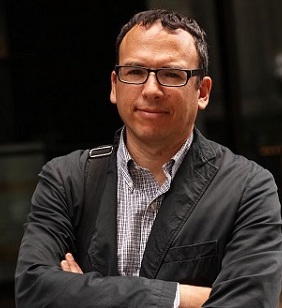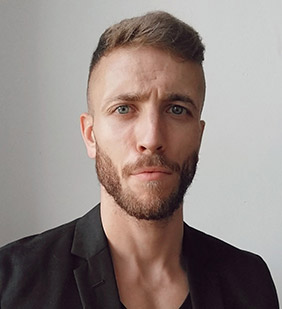- Home
- News
- Recent News
- AI Ethics at UMass Boston
AI Ethics at UMass Boston
A conversation about the Applied Ethics Center at UMass Boston.

Alec Stubbs (AS): Nir, tell me how the Applied Ethics Center (AEC) began focusing on artificial intelligence (AI) ethics.
Nir Eisikovits (NE): A few years ago, I met James Hughes, the Executive Director of the Institute for Ethics and Emerging Technologies (IEET).
James has been doing pioneering work on the ethics of cutting-edge technologies for years, first as a bioethicist and more recently with a focus on the ethics of AI. He is what we call a techno progressive—someone interested in harnessing technology for realizing socially progressive aims.
I’m a bit of a techno skeptic. We hit it off right away and had a lot of interesting conversations. We decided to start a collaboration between the IEET and UMass Boston that would explore some of the ethical challenges and opportunities that come about from increasing engagement with artificial intelligence.
As part of that process, we initiated an ambitious postdoctoral fellowship program, where each fellow would, for a period of two years, focus on a key challenge presented by AI and automation. The first fellowship, which you were hired for, Alec, was focused on automation, AI, and the future of work.
The second fellowship, which began in the fall of 2024, and for which we hired Dr. Cody Turner from the University of Connecticut, is focusing on the ethics of brain-machine interfaces, such as Neuralink.
In addition to this work mapping out the ethical challenges of AI applications, we have also written a series of policy papers, or white papers, on areas such as the influence of AI on higher education, the potential of the metaverse for work and play and the potential and risks of using chatbots for psychotherapy. Most recently James and I have started a new podcast called Prosthetic Gods, in which we debate emerging technologies – from chatbots to genetic engineering.
AS: Very cool! Tell us a little bit about your own research interests on the ethics of AI.
NE: In the last few years, my colleague, Dan Feldman, who is a senior research fellow at the center, and I have been working on an area we have framed as “AI and experience.”
The question we are asking is: If you solve some of the fairness and justice questions around AI, such as concerns related to algorithmic bias, is there anything left to worry about with the technology? In other words, if the usual liberal-, democratic, distributive, justice-type concerns are put to rest, are there any worries left? Our argument has been that technology has the potential for changing key capacities and features that we value ourselves.
For example, the increased prevalence of algorithmic decision-making has the potential to undermine our capacity for everyday practical judgments—what the Greeks have called phronesis.
Also, the advent of effective and fair AI decision-making might end up undermining the philosophical grounds for human rights, all of which are intrinsically tied to our capacities for rationality and decision-making.
Of course, you and I have recently started working on a new project focused on the role of AI as a wish-fulfillment machine, meant to decrease the role of friction in our lives.
This can be seen in the rise of chatbot friendships and the use of grief-bots, as well as in the rise of generative AI, which in some areas is meant to take the drudgery out of creative endeavors.
NE: Alec, if I might ask you a question, what has your recent research on AI and the future of work been focused on? And, more broadly, how has your time with us prepared you for your next adventure, leading Northeastern University’s Program in Politics, Philosophy, and Economics on the west coast?
AS: Broadly speaking, my work has focused on several key themes related to AI and the future of work. On the one hand, my research has investigated the impact of AI and automation on issues of labor justice. These technologies come with the promise of increased productivity, but we need to investigate the ways in which the structures of our economic system shape who gets access to the productive outputs. With the way things are currently organized, I worry that such technologies will simply benefit the wealthy few who have ownership over decisions at the site of production and in investment decisions. In recent years, for example, we know that the introduction of automating technologies has a downward pressure on wages due to its deskilling effects on workers.
I believe we need to move away from economic structures built on nondemocratic ownership and control. My suggestion is that we advocate for a system of economic democracy, where workers own and operate their own workplaces and where widespread investment decisions are made democratically. These kinds of structures exist already, although they are few and far between in our contemporary economy. Worker cooperatives, community land trusts, public investment banks—these are all possible solutions to our antidemocratic economy. But we need a political movement to build, back, and sustain such alternatives.
And you might be asking: what effect would these alternatives have on the AI and the future of work? Simply put, technological advances in AI and automation can have liberating effects for our working lives only if those who are directly affected by these technologies have a say over their development and implementation. Workplaces that are run democratically are much more likely to use labor-saving technologies to reduce the working week, freeing up time for community, family, exercise, education, and other things that contribute to human well-being. But insofar as workers themselves have no say over what and how such technologies are implemented, they are more likely to be laid off, face competition from robots, or have their work devalued and deskilled without their input.
NE: And what other themes are you working on?
AS: I’m interested in these questions of economic democratization for this simple reason: I believe that our contemporary lives are so dominated by the capitalist work ethic and economic inequalities that we often miss out on the most important aspects of the good life. So for me, I also am interested in thinking about what constitutes meaningful work, what makes for meaningful leisure, and how we can envision a future world in which the right balance is struck. We know that some people find their work deeply meaningful, but only if it is relatively autonomous, allows them to develop their capabilities, gives them a sense of purpose and community, and, of course, gives them adequate access to resources that will allow them to flourish.
Our current world of work provides us with very few of these things, and so part of my work is to think about finding that sweet spot where one can engage in deeply meaningful work but under circumstances in which that work does not dominate one’s entire life.
NE: Where has your work taken you after your time at UMass Boston?
AS: As you mentioned, I am an assistant teaching professor at Northeastern Oakland, and I’m the program coordinator for their Politics, Philosophy, and Economics program. Our goal is to grow a program that allows students to engage in issues of economic and social justice, so it aligns perfectly with my own goals and the work I’ve done while here. My time at UMass Boston has been instrumental in building a strong platform to take on this kind of work. I’ve had the freedom to research, write, teach, and engage in public scholarship—opportunities that I would not have had elsewhere. I’m proud to have been a part of such a forward-thinking group of folks at the AEC and IEET, and I can’t wait to see where it goes from here!

Applied Ethics Center, Director, Professor of Philosophy

Applied Ethics Center, Postdoctoral Research Fellow 2022–24